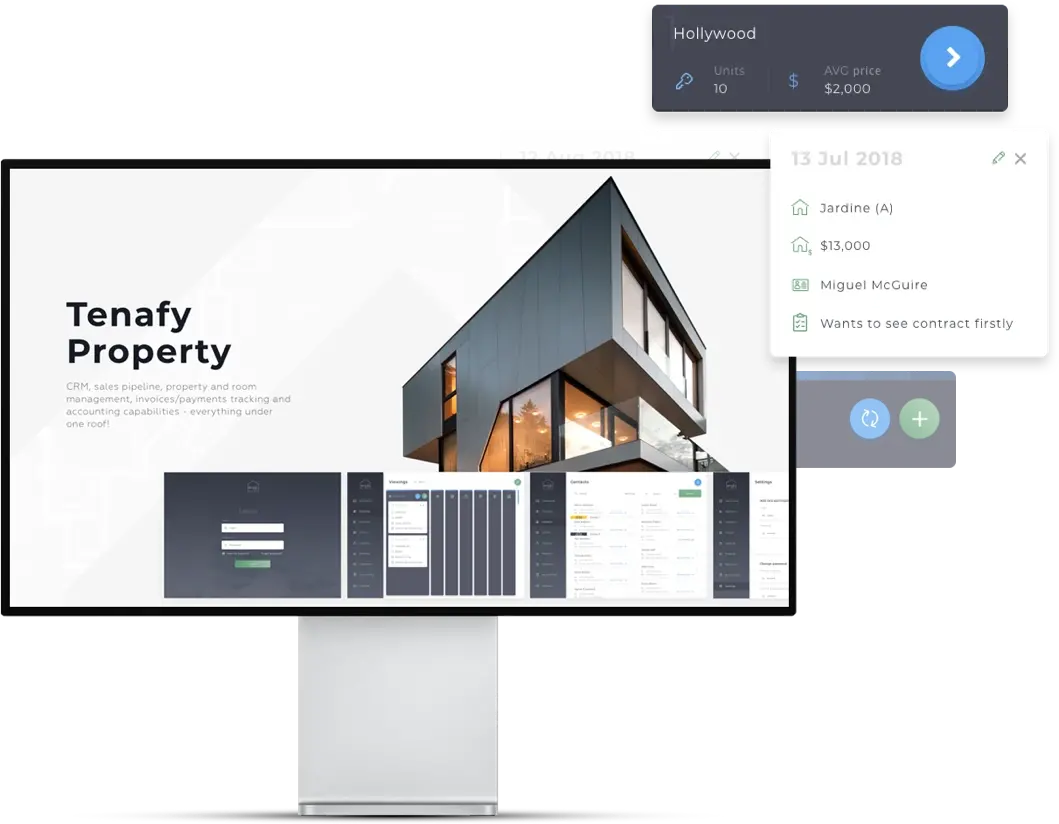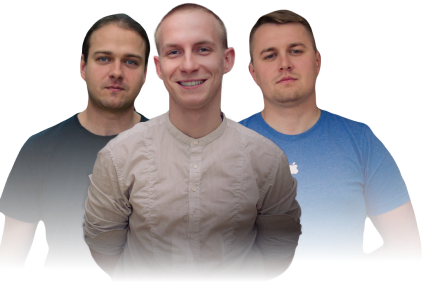Without an effective real-time monitoring system, even expensive real estate can become not a profitable business but a real headache. To prevent this from happening, software solutions are being implemented to ensure transparent communications between owners, tenants, and maintenance personnel and manage customer bases.
According to forecasts, by 2027, the global market size for such software will exceed $3 billion, so this is a good incentive for developers. But how to develop property management software for real estate to receive an efficient product?
At Requestum, we specialize in creating software products for a wide variety of industries. In this article, we are eager to share our own experience in property management software development.
What Is Property Management System Software?
Property management system software is a complex program the purpose of which is to automate and optimize any actual estate-related business operations. It simplifies the process of planning and solving maintenance tasks, and financial management, including tracking and collecting rent.
Explore the expenses behind building a property management system
Property management information system: varieties, functionalities, and benefits
Such a software product is usually based on a robust local server infrastructure or in the cloud and can be used in different areas. You will have to choose the right type of software and the required set of features since the application's success will be determined by its model, which is selected based on the company's core business.
In the field of commercial real estate, solutions are in demand that allows you to manage:
- Maintenance of office buildings and retail outlets;
- Placement and state of public art objects;
- Leased spaces
Rental property management software development is popular because it provides excellent opportunities:
- Significantly reduced maintenance time;
- Convenient real-time collection of information about rent and rental payments;
- Effective online reporting and analytics
For homeowner associations and condominiums, the residential management system makes it easy to:
- Form, store, and deliver reports;
- Implement electronic payments;
- Keep accounting records
For hoteliers and hostel managers, the following functions are essential:
- Timely registration of visitors;
- Reservation, accounting of free rooms, and determination of the reserve fund;
- Payment of bills
Specialized software streamlines day-to-day processes by integrating property management databases. This frees you from employing third-party resources, generally allowing you to standardize and improve management efficiency. Successful introduction of the such system allows:
- Getting the necessary information about the condition of buildings on the go, checking certificates, insurance, and banking information, and creating comprehensive reports. Remember that, in time, you would require additional functionality, so high scalability is vital.
- Significantly reducing paperwork and searching for the needed information in a matter of seconds. In addition, the system will provide easy access to data with high security. You do not have to worry about renewing contracts. At the same time, you can send personalized notifications and reminders to tenants. In turn, they will be able to pay for services and receive invoices online, which is beneficial and convenient for everyone.
- Simplifying and optimizing business processes, thus saving time, production, technical, human resources, and finances. You can enhance it a lot if you add chatbots and virtual assistants. Automation with the introduction of artificial intelligence will allow you to focus on other projects. In addition, the chance of human errors will be greatly reduced.
- Introducing innovations. For instance, IoT-based technologies provide ample opportunities, including savings. More importantly, they significantly increase the attractiveness of your offers in the eyes of customers and partners.
Tenafy Case Study: Streamlining Property Management Digitally

How to Develop Property Management Software: Subtleties
Custom development is a way of building a system from scratch. Such a solution is easier to adapt to the needs of the specific business because it will contain precisely the functionality you need. At the same time, the software must provide the following:
- Easy integration with third-party APIs and payment instruments;
- Possibility of system expansion;
- Maximum compliance with the expectations of the target audience
The implementation of these tasks takes place in several stages.
1. Create a property management system: Comprehensive market and competitor analysis
Based on the acquired data, you need to compile a list of requirements, including an overview of the project, goals, your audience, desired feature set, etc.
2. Selection of a reliable software development contractor
To do this, you must check the portfolio, evaluate reviews, and pay attention to the companies and industries they serve.
3. Product discovery
At this stage, it is crucial to define the business and users and create user stories as well as customer roadmaps. In this case, you can rely on surveys of all interested parties, including potential users. In addition, it is necessary to develop an optimal monetization strategy.
4. UX/UI design
We recommend following the algorithm:
- Formulate ideas;
- Create MVP;
- Conduct extensive user testing;
- Make the final design decisions based on the collected feedback
Based on the concept and design of the application, it is necessary to create an information architecture and framework.
Having extensive experience in custom software development, we must assert that such a system should include capabilities for communication between users of different affiliations - company departments, tenants, municipal services, etc. - such as endpoint apps of varying access levels. Another point to keep in mind - a responsive design is critical for endpoint apps as the mobile gadget market is vast, and the variety of screen sizes, hardware capabilities, and platforms can be staggering.
5. Development and integration
The system should be based on a high-quality exchange of information between the management company, contractors, and tenants (applications for maintenance, various requests, notifications, document flow, and communication between users).
As for the technology stack, the choice depends on many factors. For example, suppose you need an embedded tenancy management system or an IoT sensor system. In that case, you will need knowledge of C# or C++. For API development, you must look for React.js or Node.js specialists.
In any case, you will need a DevOps professional who has experience with cloud computing, as well as software and security testers.
For example, Requestum adheres to the strictest industry standards when trained experts with the highest qualifications develop each element.
Now, let us discuss more features that a software complex of such a class must include.
- User registration. To successfully implement the authentication system, it is necessary to reduce the number of steps required to register. The algorithm should be simple and intuitive.
- Information search. This feature is one of the most important. It should be extremely fast and convenient, with many filters allowing you to accurately create the most specific request.
- Customer support. Communication with customer support should be convenient and stable. The more channels, the better. Remember to connect social networks. This can also include video tutorials and chatbots.
- Payment options. Often tenants need to split the check. At the same time, rent payments must be received directly into the lessor's account. The payment history feature is also essential, especially to avoid misunderstandings between owners and payers. The platform should automatically bill for late payments and store checks in one place.
- Capabilities for property review. The system should allow the selection of the best offer based on ratings, reviews, and photo documents. Presentation videos or 3D tours will help to demonstrate the leases most effectively.
- Integration capabilities. Stakeholders often need to turn to third-party services to resolve various issues, from purely technical and logistical to legal. Consider providing the capabilities for connecting them to your platform and thus simplify the interaction of the management company with business centers, contractors, and tenants.
6. Quality control and release
Proper testing is essential. You can use various methods, such as UX eye-tracking, focus group assessments, and usability reports. An integrated approach will give a deeper understanding of the big picture. Launch the product, making sure it meets your requirements.
Let’s create perfect software solution for your business
Additional advice
Here is some extra advice to help you in creating property management software:
- Try to integrate only some processes at a time. Start gradually.
- Involve all stakeholders immediately. Collect reviews regularly to ensure the product is visually presented well and works flawlessly.
- Add only the features you need by reading reviews. Find the right way to conduct surveys
Our Case Study
One of our clients is DIM9000, a modern management company that maintains real estate, including apartment buildings and surrounding areas. They prioritize resident comfort through tasks such as equipping sports and children's grounds, timely waste removal, and general cleaning. They also offer full house service and act as intermediaries between residents, builders, and public authorities.
It was found that residents struggle to get sufficient feedback from housing maintenance offices and feel that they are paying for inadequate services. So, our challenge was to establish a clear, transparent, and predictable communication channel between residents and real estate service providers.
We have successfully developed a product ecosystem that consists of a mobile app for residents, a mobile app for staff, and a CRM system for house dispatchers, managers, and the quality control department. The ecosystem optimizes communication between end consumers and contractors which has led to improved service quality and increased customer satisfaction levels.
What Should the “Proper” Property Management Information System be Like?
Today it is much easier to find and even buy a good house at a low price than to organize its effective maintenance. The fact is that these processes are associated with much money, and a low-quality product can jeopardize your financial well-being. Therefore, a specialized solution must be safe and convenient.
To create a property management system, it is not enough to know how the market works, understand its trends, and be able to see your prospects in time. With good technical expertise, achieving an excellent result quickly will be possible. You will have to invest in developing and protecting user data, etc. You should employ an outside aid if you are a realtor, manager, or financier.
How to develop property management software? The professionals at Requestum will take into account your individual needs and will be happy to help you. We have the necessary experience, technologies, and expertise to create a software masterpiece tailored to your most specific requirements. Contact us for a consultation to get the best property management information system for your business as soon as humanly possible!

Our team is dedicated to delivering high-quality services and achieving results that exceed clients' expectations. Let’s discuss how we can help your business succeed.




SHARE: